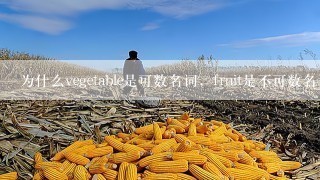为什么fruit是不可数名词而vegetable是可数名词?为什么vegetable是可数名词,fruit是不可数名词

1、为什么fruit是不可数名词而vegetable是可数名词?
fruit不是不可数名词,而是可变名词。笼统当作“水果、果实”的意思时,是单数,如果指各种各样的“水果、果实”,是复数;如果是“成果、硕果”的意思,就是一般的可数名词。

2、为什么vegetable是可数名词,fruit是不可数名词
vegetable
作为蔬菜,它是可数的。作为植物,它是不可数的。
fruit
作为平时我们吃的水果是不可数的。在科普文章里,它是可数的。
因此,“水果和蔬菜”,翻译成英语就是:fruit
and
vegetables.。

3、vegetable为什么是可数名词?
vegetable
[5vedVitEbl]
n.
蔬菜,植物,生活呆板单调的人
adj.
蔬菜的,植物的
vegetable
veg.e.ta.ble
AHD:[vµj“t…-b…l,vµj“¹-t…-]
D.J.[6ved9t*b*l,6ved9!t*-]
K.K.[6vWd9t*b*l,6vWd9!t*-]
n.Abbr.veg.(名词)缩写veg.
Aplantcultivatedforanediblepart,suchastherootofthebeet,theleafofspinach,ortheflowerbudsofbroccoliorcauliflower.
蔬菜:因其可食部分而种植的植物,如甜菜根、菠菜叶或者椰菜、花椰菜的花蕾等
Theediblepartofsuchaplant.
这种蔬菜的可食部分
Amemberofthevegetablekingdom;aplant.
一种蔬菜:蔬菜王国的一员;植物
Apersonwhoisregardedasdull,passive,orunresponsive.
生活呆板、懒散的人:一个愚笨的、木纳的和无反应的人
adj.(形容词)
Of,relatingto,orderivedfromplantsoraplant.
植物的:属于、关于或源于植物的
Suggestiveoforresemblingaplant.
似植物的:使人联想或象植物的
Growingormultiplyinglikeplants.
繁衍的,广泛生长的:象植物那样生长或繁殖的
FromMiddleEnglish[livingandgrowingasplantsdo]
源自中古英语[象植物那样生活和生长的]
fromOldFrench
源自古法语
fromMedievalLatinveget³s
源自中世纪拉丁语veget³s
fromLateLatin[enlivening]
源自后期拉丁语[有生气的]
fromLatinveget³e[toenliven]
源自拉丁语veget³e[使有生气]
fromvegetus[lively]
源自vegetus[生动活泼的]
fromveg¶e[toenliven]*seeweg-
源自veg¶e[使有生气]*参见weg-
WhenthespeakerinAndrewMarvell's“TohisCoyMistress”tellshismistressthat“Hadwebutworldenough,andtime.../Myvegetableloveshouldgrow/Vasterthanempiresandmoreslow,”he“makesonethinkofpumpkinsandeternityinonebreath,”asonecritichasplayfullysuggested.However,vegetableinthiscaseisusedfigurativelyinthesense,“havingthepropertyoflifeandgrowth,asdoesaplant.”ThisuseisbasedontheancientreligiousandphilosophicalnotionofthetripartitesoulasinterpretedbytheScholastics:thevegetativesoulcommontoplants,animals,andhumans;thesensitivesoulcommontoanimalsandhumans;andtherationalsoul,foundonlyinhumans.“Vegetablelove”inMarvell'spoemisthusalovethatgrows,takesnourishment,andreproduces,althoughitgrowsslowly.Marvell'suseillustratestheoriginalsenseofvegetable,firstrecordedinthe15thcentury.Inaworkpublishedin1582wefindrecordedforthefirsttimetheadjectiveuseofvegetablefamiliartous,“havingtodowithplants.”Inaworkofthesamedateappearsthefirstinstanceofvegetableasanoun,meaning“aplant.”Itisnotuntilthe18thcenturythatwefindthenounandadjectiveusedinthemorerestrictedwayassociatedwiththeinjunction“Eatyourvegetables.”
当安德鲁·马韦尔的“致他的羞涩情人”一诗中的说话者告诉他的情人“如果我们有足够的世界和时间…/我的植物一样的爱会生长得/比帝国更广大、更慢”时,他“使人想起了南瓜以及一息之间的永恒,”某个批评家开玩笑似地说。然而,在这个情况下vegetable是被用于比喻意义上的,意思是“象植物一样具有生命和生长的性质”。这一用法是基于由经院哲学家所释的三重灵魂的古代宗教和哲学观念之上的:vegetative的灵魂为植物、动物和人类共有;sensitive的灵魂为动物和人类共有;而rational的灵魂却只存在于人类中。因此马韦尔诗中的“植物的爱”是一种生长的、吸取营养并繁殖的爱,但是它长得很慢。马韦尔的这一用法指示了vegetable的原先的含义,最早记录于15世纪。在一部出版于1582年的作品中,我们第一次找到了已为我们熟悉的vegetable一词的形容词用法的记录,意思是“与植物有关的”。在同一时期的另一部作品中,出现了vegetable作为名词用的第一个例子,意思是“植物”。直到18世纪,我们才发现该名词和形容词被用于与“吃你的蔬菜”这一命令相关的更受限制的方式中
vegetable
[5vedVItEb(E)l]
n.
蔬菜
植物
〈医〉植物人
vegetable
adj.
植物的
Weusevegetableoilforcooking.
我们用植物油烧菜。
vegetable
来自拉丁语vegetabilis。

4、vegetable为什么是可数名词?
这个单词有两种词性,既是可属名词也是不可属名词。当你要表达的意思是多种多样的蔬菜是,就可以用vegetables,即复数形式。如果你要表达的是蔬菜这个整体,那么就用单数形式,即vegetable,但这个单词的常用法一般是用作单数形式!。

5、vegetable为什么是可数名词?
这个单词有两种词性,既是可属名词也是不可属名词。当你要表达的意思是多种多样的蔬菜是,就可以用vegetables,即复数形式。如果你要表达的是蔬菜这个整体,那么就用单数形式,即vegetable,但这个单词的常用法一般是用作单数形式!。

6、vegetable为什么是可数名词?
这个单词有两种词性,既是可属名词也是不可属名词。当你要表达的意思是多种多样的蔬菜是,就可以用vegetables,即复数形式。如果你要表达的是蔬菜这个整体,那么就用单数形式,即vegetable,但这个单词的常用法一般是用作单数形式!。





































































